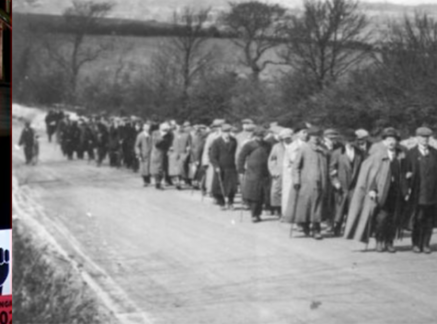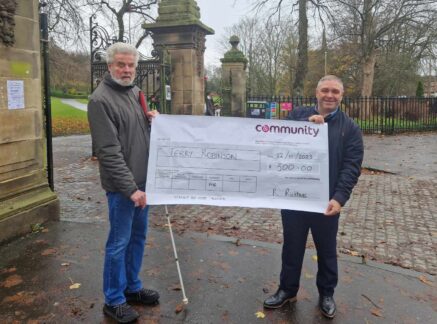In 2019 the government announced that they would be developing a green paper which would find ways to improve support for disabled people. There is now a consultation running to help make sure that the bill reflects the views of disabled people in the UK.
Community will be representing our members’ views in a response to the consultation, and we’d love to hear from you.
Please tell us if there’s anything you want us to share about the following topics by emailing us at research@community-tu.org:
- How easy it is to access and understand forms and services from the DWP
- Advocacy (having someone who supports you to express your views and wishes, and helps you stand up for your rights)
- Mobility schemes (such as Motability)
- Making it easier for you to work, including schemes like Access to Work and the Disability Confident scheme
- Government’s ways of helping disabled people who are out of work to find work
- Your experiences with Work Capability Assessments and Job Centre Plus
- Digital services for disabled people
- PIP
- Anything else you want to tell us about your experiences of government support
If you only want to mention a few things or respond on just one of the topics, that’s great.
You can see the full list of questions we’ll be answering below.
You can find the information about the consultation in more detail here.
If you’d like to contribute to the consultation in full yourself, you can do so through this online survey.
You can also find audio, British Sign language, easy read, and large print versions of the consultation here.
Chapter 1: Providing the Right Support
- What more could we do to improve reasonable adjustments to make sure that our services are accessible to disabled people?
- What more information, advice or signposting is needed and how should this be provided?
- Do you agree with the principles we have set out for advocacy support?
- How might we identify people who would benefit from advocacy?
- What kinds of support do you think people would want and expect from advocacy?
- Are we meeting disabled people’s mobility needs? Please tell us why/why not.
Chapter 2: Improving Employment Support
- What more could we do to further support employers to improve work opportunities for disabled people through Access to Work and Disability Confident?
- How can we support people who have fallen out of work to identify and consider suitable alternative work before their Work Capability Assessment?
- What further support or information would help work coaches to have more effective conversations with disabled people and people with health conditions?
- What has been your experience of receiving employment support? What was good about the support? Are there further improvements that can be made?
- How can we make the most of the knowledge and expertise of local organisations to support disabled people and people with health conditions into employment?
- What more could we do to work with other organisations and services, such as local authorities, health systems, and health services offered in the devolved administrations, to provide and join up employment support in health settings?
- What can we offer that would encourage people in the Support Group or LCWRA to take up our employment support?
- Would you be happy to access employment support digitally? Please tell us why/why not.
- What should we consider when developing a digital support offer for disabled people and people with health conditions?
- How can we better support young disabled people and people with health conditions who are moving out of education to find appropriate work?
Chapter 3: Improving Our Current Services
- During the coronavirus pandemic we introduced assessments by telephone and video call as a temporary measure. In your view, in future, what mixture of methods should we use to conduct assessments?
- How could we improve telephone and video assessments, making sure they are as accurate as possible?
- What more could we do to reduce repeat assessments, where someone has a condition that is unlikely to change?
- Decisions can be changed after an appeal has been lodged but before a tribunal hearing takes place. How can we improve the way we communicate a new decision in this situation?
- What other changes could we make to improve decision making?
- How could we improve the experience when people claiming Child DLA are invited to apply for PIP?
Chapter 4: Re-thinking Future Assessments to Support Better Outcomes
- Is there anything about the current PIP activities and descriptors that should be changed? (Yes/No/Don’t know)
- If yes, what changes to the PIP activities and descriptors should we consider?
- Is there anything about the current WCA activities and descriptors that should be changed? (Yes/No/Don’t know)
- If yes, what changes to the WCA activities and descriptors should we consider?
When responding to these questions, please consider:
- What the best way to capture the impacts of health conditions that fluctuate might be.
- How we could ensure the activities and descriptors capture the impact of all health conditions and disabilities fairly;
- How we could simplify the assessment criteria; and
- Any possible PIP or WCA activities that are no longer a barrier or that are less of a barrier to employment or independent living, due to modern working practices and advances in assistive technology.
- Should we seek evidence from other people, such as other health professionals and support organisations?
- What type of evidence would be most useful for making decisions following a WCA or PIP assessment, and should there be a standard way to collect it?
- How could we make sure the evidence we collect before a WCA or PIP assessment directly relates to a person’s ability to do certain things?
- How could we improve assessments or the specialist support available to assessors and decision-makers to better understand the impact of a person’s condition on their ability to work or live independently?
- How can we make it easier for people to inform us if their condition or circumstances have changed so that a review of entitlement can be carried out at the right time?
- What could be included in a discussion to develop a more personalised employment and health support plan?
- What skills and experience should the person undertaking an employment and health discussion have?
Chapter 5: Exploring Ways to Improve the Design of the Benefits System
- How could we simplify the system for people applying for multiple health and disability benefits?
- Universal Credit (UC) has many features, such as the work allowance and taper, that aim to make it easier for people to move into work. How can we ensure that disabled people and people with health conditions are aware of these features, and encourage people to try out work on UC?
- How could the current structure of benefits be changed to overcome people’s financial concerns about moving towards employment?
- How could the current structure of benefits be improved so people can better manage changes in benefit entitlement?
- While continuing to focus financial support on people who need it most, how could we more effectively support disabled people with their extra costs and to live independently?
- Should we explore options to make it easier for disabled people to access practical support such as aids, appliances or services, and why?
- What particular types of practical support should we help disabled people access?
Thank you. We have received your query
We have received your query and a member of our Service Centre Department will be in touch to discuss further with you.
Due to service demands it is not always possible for our advisors to reply to your query immediately. We aim to respond within 48 hours of receipt.
If your employer has invited you to a formal meeting (disciplinary, grievance or appeal) and you are seeking representation, if you have not already done so via this form, please provide us with all relevant supporting information including any notes/minutes from any investigation process and your email/letter of invitation, which should include full details of when and where the meeting is due to take place.
Please note that representation is not provided for investigation meetings.
If you have any further queries, please contact our Service Centre Department on 0800 389 6332 or at servicecentre@community-tu.org.
Not a member?
Let’s get to know each other.
"*" indicates required fields
"*" indicates required fields










